Interestingly, the sphere of law and jurisprudence has been rather skeptical of the digital revolution. The tools of informatics seem to be highly suited to dealing with issues that arise in the course of legal affairs: The legal system consists of and is confronted with large bodies of complex textual data that follow rational and objective principles. Informatics is a science that promises to help solve this problem as it has brought about new insights on how to effectively organize und use complex data. Algorithms with excellent precision can perform tasks that involve a lot of data without much effort; in former times, comparable tasks could only be fulfilled by employing knowledgeable people for a long time.
This presentation describes several initiatives in the field of LegalTech and digitization of legislation and jurisprudence with a strong focus on text and data analytics as well as the computational formalization of legal decision structures.
 Bernhard Waltl has been a research associate at the chair for Software Engineering of Business Information Systems (sebis) at the Technische Universität München since May 2014. He holds a master's degree in Informatics from the Technical University of Munich. Additionally, he holds a master's degree in Philosophy of Science and Technology (WTPhil) from the Munich Center for Technology in Society (MCTS), with a focus on philosophy of science, epistemology, and philosophy of language.
Bernhard Waltl has been a research associate at the chair for Software Engineering of Business Information Systems (sebis) at the Technische Universität München since May 2014. He holds a master's degree in Informatics from the Technical University of Munich. Additionally, he holds a master's degree in Philosophy of Science and Technology (WTPhil) from the Munich Center for Technology in Society (MCTS), with a focus on philosophy of science, epistemology, and philosophy of language.
His research area include semantic analysis of legal texts, network analysis for legal documents, and applied artificial intelligence for the legal domain (e.g., legal reasoning, and smart contracts). Within his research he cooperates with leading legal scientists and practitioners. More detailled information about this cooperation can be found on www.lexalyze.de and www.en.lexalyze.de. Beside several publications on relevant conferences he is in the program comittee of the international legal informatics symposium (IRIS), and co-organized the scientific workshop series on Legal Data Analysis at Jurix conference on legal informatics. In addition, he is reviewing publications for international conferences on legal informatics, e.g., MWAIL, IRIS, LDA, ASAIL, information systems, e.g., BIS, but also for data mining topics in law journals, e.g., Journal of International Economic Law.
He is interested in applications of semantic software, logic based reasoning, and cognitive computing. Due to his studies and personal interests he is also open to various interdisciplinary topics, e.g., philosophy of science, game theory, decision science, etc. Together with social institutions he voluntarily committed himself to a volunteer-refugee project.
